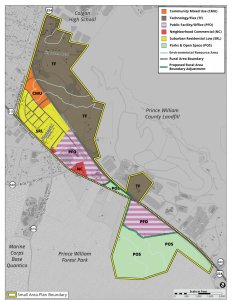 Overview of the Independent Hill Small Area Plan. Prince William County Planning Commission.
Overview of the Independent Hill Small Area Plan. Prince William County Planning Commission.In a 5-3 vote, the Prince William Board of County Supervisors approved the controversial Independent Hill Small Area Plan, at its Mar. 16 meeting that ran until 2 a.m., the next day. The long meeting followed more than four hours of citizen’s time, in which most citizens spoke against the plan, mainly due to the inclusion of an area zoned for a data center.
The vote fell along party lines. Democrats Chair Ann Wheeler, Supervisors Andrea Bailey (Potomac), Kenny Boddye (Occoquan), Victor Angry (Neabsco) and Margaret Franklin (Woodbridge) supported it.
Republican Supervisors Jeanine Lawson (Brentsville), Pete Candland (Gainesville) and Yesli Vega (Coles) voted against it.
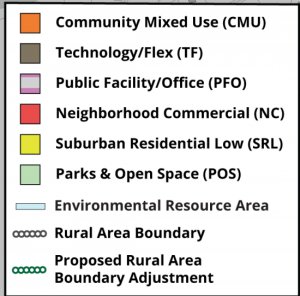 Key to above map
Key to above mapThe area dubbed “Independent Hill” is comprised of 544 acres mostly in the Potomac District and partly in the Coles District.
It lies between Bristow Road to the south and Dumfries Road to the north. It is located adjacent to Prince William Forest Park, the Prince William Landfill, Animal Shelter, Kelly Leadership Center, Colgan High School, and Hellwig Memorial Park.
The Small Area vote amends the county’s comprehensive plan, but any development still needs board approval. According to staff, it could feature a residential neighborhood of 140 detached residential homes, 304 attached homes and 200 apartments, some over small commercial spaces in a village or main street- like setting. It would be a community with bike and walking trails.
The plan features is a Tech/Flex district near Two Towers Road, replacing a Special Use zoning area. It may provide a space appropriately zoned for a new data center. The plan also a small area set aside for business space, or public facilities such as government offices or libraries.
Adjacent to Prince William Forest park would be 120-acres of green space for passive recreational use such as hiking or biking. Trails would connect through neighborhoods to schools, work centers and the national park. The open space would serve to protect the park and its habitats and preserve open space without significantly changing the landscape.
And although the comp plan is a tool of long-term planning, supervisors indicated that the plan would be realized quickly.
Despite some attractive features, the vote was highly controversial because it opens up land in the county's Rural Crescent to clustered homes and a mixed-use district. It also would run sewer lines into the crescent. The proximity of the data center area to a National Park was also extremely unpopular among citizens. They worried about watershed, indigenous species and the negative effects on tourism.
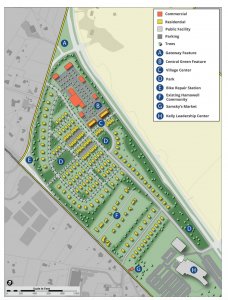 Neighborhood residential and commercial area.
Neighborhood residential and commercial area.While representatives of the National Park Service had to remain neutral, Forest Park’s Superintendent Chris Alford said that they always have concerns about the protection of indigenous species and not overcrowding the park.
However, Planning Department touted the benefits of the Small Area Plan. The mixed-use village is intended to provide a walking community and to cut down on long commutes. Apartments would attract more people without children. New businesses and homes could serve those already working in the area.
On the downside, the area is not connected to public transport and Colgan High School is already past capacity. The plan did not win the approval of the Planning Commission, as commissioners found it incongruent with the Rural Crescent land use policy.
However, staff noted that approving the plan does not necessarily mean approving the developments. The developers would have to adhere to all county restrictions and perhaps they would go above and beyond those requirements.
In regard to Tech/Flex area, some supervisors argued it would be better to not rezone it and allow an applicant to apply for a special use permit. In that scenario, the supervisors could have more control over proffers and restrictions and could deny a permit.
Supervisor Andrea Bailey of the Potomac District called the plan a “win-win.” She liked that it preserves 120 acres of land and develops land in accordance with “smart growth.”
Occoquan Supervisors Kenny Boddye said it takes “forgotten area” of the county and preserves green space while building the kind of community people want. He called rural verses development a “false dichotomy.” If they do nothing the landowner could lumber trees and they would get no smart growth and no trails and not much protection for the park either.
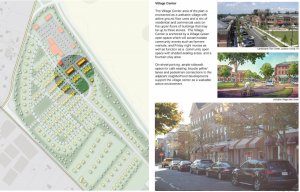 Examples of possible neighborhood designs. Prince William Planning staff.
Examples of possible neighborhood designs. Prince William Planning staff.But Supervisor Vega, who represents the Coles District was very opposed to the plan. In talking to her constituents, she said that no one wanted a data center near Prince William Forest Park and she had worked for a year to split this plan but her request was denied.
Brentsville Supervisor Jeanine Lawson said the plan further chips away at the Rural Crescent and “opens the door wide” to development. She said there is bipartisan support for protecting the rural areas in the county, including the Coalition to Protect Prince William County, the Conservation Alliance, the Sierra Club and several state and national elected leaders. “The resounding support for the Rural Crescent is very clear.”
Neabsco Supervisor Victor Angry said the board no longer needs to abide by Rural Crescent policy set in 1999 since it was intended to last for 20 years. He said as no new plan was adopted, they can now develop the land as they see fit.
Lawson disagreed, saying there was no set “sunset” on the Rural Crescent policy.
Candland Supervisor said the rural areas of the county provide value to the entire county.
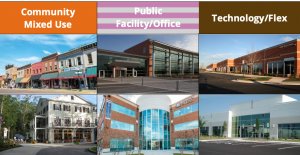 Examples of new development planned for the Independent Hill are. Prince William Planning Department.
Examples of new development planned for the Independent Hill are. Prince William Planning Department.But Chair Ann Wheeler said much of these arguments are disingenuous.
“[I get] frustrated when people make this about water when it’s not actually about water. ” She said that the watershed will not be affected since Prince William gets its water from above ground sources. And if people really wanted to improve the water quality, they would put everyone on sewer rather than sink more septic.
She said she trusts the planning department that they will properly mitigate any environmental impacts and said Prince William Forest Park is a jewel she would never jeopardize
Supervisor Vega offered a substitute motion to divide the question, so that her district would be exempt from the plan. Wheeler said she did not understand how that could be done. That vote failed 5-3.
Following that vote, Vega, Lawson and Candland walked out of the meeting; then Wheeler called for a recess. After the recess, near 2 a.m., supervisors seemed to accept that the Small Area Plan would be approved and made their closing statements.
Wheeler would not allow Lawson to speak again claiming she already spoke twice on the motion, and the two had a verbal scuffle.
Supervisor Angry said he was extremely frustrated. His property had been vandalized with profanity, and he believes it is over his support for this decision.
Support Bristow Beat - Donate Today!